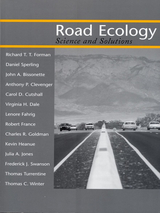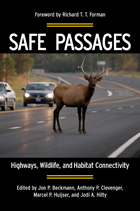
A central goal of transportation is the delivery of safe and efficient services with minimal environmental impact. In practice, though, human mobility has flourished while nature has suffered. Awareness of the environmental impacts of roads is increasing, yet information remains scarce for those interested in studying, understanding, or minimizing the ecological effects of roads and vehicles.
Road Ecology addresses that shortcoming by elevating previously localized and fragmented knowledge into a broad and inclusive framework for understanding and developing solutions. The book brings together fourteen leading ecologists and transportation experts to articulate state-of-the-science road ecology principles, and presents specific examples that demonstrate the application of those principles. Diverse theories, concepts, and models in the new field of road ecology are integrated to establish a coherent framework for transportation policy, planning, and projects. Topics examined include:
- foundations of road ecology
- roads, vehicles, and transportation planning
- vegetation and roadsides
- wildlife populations and mitigation
- water, sediment, and chemical flows
- aquatic ecosystems
- wind, noise, and atmospheric effects
- road networks and landscape fragmentation

- an overview of the importance of habitat connectivity with regard to roads
- current planning approaches and technologies for mitigating the impacts of highways on both terrestrial and aquatic species
- different facets of public participation in highway-wildlife connectivity mitigation projects
- case studies from partnerships across North America that highlight successful on-the-ground implementation of ecological and engineering solutions
- recent innovative highway-wildlife mitigation developments
Safe Passages is an important new resource for local-, state-, and national-level managers and policymakers working on road-wildlife issues, and will appeal to a broad audience including scientists, agency personnel, planners, land managers, transportation consultants, students, conservation organizations, policymakers, and citizens engaged in road-wildlife mitigation projects.
READERS
Browse our collection.
PUBLISHERS
See BiblioVault's publisher services.
STUDENT SERVICES
Files for college accessibility offices.
UChicago Accessibility Resources
home | accessibility | search | about | contact us
BiblioVault ® 2001 - 2024
The University of Chicago Press









